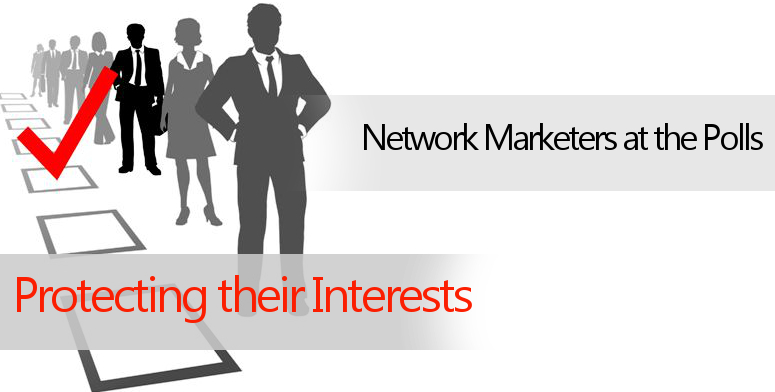
We are heading into the fall quarter, an appropriate moment in time to share a conversation I had with several friends about network marketers and the determinative impact they can have to shape lives, and civic and political discourse at the local, state, and national levels. I assured each of them their names would not be attached to any particular statements. The content and tone of my conversations will sound familiar to some of you. Read through to the end and I think you will understand why.
How did the conversation begin? Each of us has confronted the “quizzical” expression on a good friend’s face – or friends – when they learn we are network marketers. Let me be specific: These are the friends you feel are already too successful to consider network marketing as a serious opportunity or feel their academic credentials preordain a greater destiny. They may have tried products or services available through network marketing but recoil at the notion that it is, or could be, anything they would ever consider seriously. I mean, where is the social status conferred by that all-important title that gives meaning to how we wish to be perceived by others? This may sound a little mean-spirited but the truth lurks very close to the surface of their rejection. Some friends will also insist the business model does not work but Wall Street and a growing number of economists and business leaders would disagree with that assertion.
I interpreted that friend’s expression as a combination of unexpressed emotions: For example, “Not you!” Or, “What happened to you?” Then there is, “Is it that bad?” What confounded my friends even more was to learn we are not only proud and enthusiastic about being network marketers, but we do see the industry as Eric Worre calls it, “a better way.” So, have some fun and ask your friends, why they are not?
I will digress for a moment: The most direct – and honest – response to the question I raise in the title is, “no” – network marketers are no different than you or I. The truth is, as I put it to friends, network marketers are “us!” The 16 million Americans (WFDSA Fact Sheet 2013) who represent Direct Selling companies in the United States are family members, friends, neighbors, colleagues, and others representing practically every category of professional imaginable. Some categories of professionals among our growing ranks might even surprise you, e.g., nurses, doctors, neurosurgeons, lawyers, bankers, small business owners, Millennials, and professional athletes, to name a few.
None of the friends I spoke to had children, therefore, I suggested they listen to the laments of many young college graduates today burdened by student loans that average more than $29,400 at graduation. They are frequently a first-generation graduate and fearful their job prospects will not (and do not) afford them the ability to repay loans in less than a lifetime, have a life, and plan for the future. Many graduates know that around 40 percent of recent college graduates are underemployed. Given this reality, network marketing, I pointed out, is an attractive alternative because it allows members of this generation to entertain a different set of possibilities.
Let’s return to the explicit question etched in friends’ faces upon hearing I was now a network marketer. Here was the context for our discussion. We are no longer the robust economy we were prior to 2008. On this point, my friends and I were in agreement. We diverged somewhat on how to frame options in response to economic ground that shifted under everyone’s feet.
The fallout from the economic and financial collapse in 2008 compelled millions of Americans – and legions of others around the world – to make different choices than they might have made earlier. So, I pointed out, those who lost jobs, careers, homes, and even families – now saddled with more debt – could only lament feelings of helplessness and the lack of real opportunities being created for anyone outside minimum wage jobs – previously called “the jobs of the 21st century.”
The options available were fewer and less desirable, but one of them was network marketing. But “why network marketing?” several friends asked almost plaintively. “Only a few ever make any real money!” (The second part of this statement reflects a serious ignorance about the industry. This statement also suggests everyone’s financial goals are the same. That’s fine…one step at a time.) “Why?” I said. “Well, let’s think about this for a moment. First, there was the lost cost of entry and the high potential return.” I said “high potential return”, not guaranteed return. I wanted to emphasize this at the outset because, as many entrants to the job market today discover, there are no guarantees your employment is secure; no guaranteed benefits, no guaranteed salary advances. You can’t look to anyone to save you – not the government, and certainly not any company. The one guarantee you do have is the average wage/salary compensation will be inadequate to build a life. The only security you have is YOU. I think I expected my friends to rebut this last point, but none chose to do so.
“Another attraction in network marketing for the serious investor,” I continued, “was you have the support of your organization and those in your current company – something many did not have with a recent employer. Look at it this way: We may be in business for ourselves but we are not in business by ourselves. Also, the level of risk was acceptable. Hard work and skills’ development were nothing new; just applied to a different opportunity.” Surveys frequently reveal that 75 – 80 percent of those between the ages of 18 and 30 do not like their jobs and their unemployment rate is 15 percent – more than twice the national average.
In network marketing, I went on to say, “we also discovered a genuine level playing field that did not have any of the historical barriers to entry: age, gender, race, education, experience, or financial condition. After all, how many of us, for example, could afford a franchise in the fast food industry with the overhead of a building, employees and hours spent away from home?”
This last point may resonate with your “successful” friend especially if (s)he invested in a franchise. We all know that profits from a franchise during the first 3-5 years are negligible, overhead can be a killer, and the hours – a real drag. But, there is the business status-thing about owning a franchise.
I was not being apologetic about my choice to become a network marketer. If anything, I was just sharing information as the friend did when they launched their franchise and couldn’t wait to tell me about it. If you have had this conversation and if your friends are reasonable, then by this point in conversation, they may have sensed you are grounded in the choice you made – as I am – and you are optimistic about your possibilities. My friends also realized I was not seeking validation from them for my decision. This would be a break-through level of awareness with some other friends.
“The qualities that unite serious network marketers,” I explained, “are our belief in our ability to leverage ourselves through network marketing to strengthen our personal and family finances; a desire to live larger lives that have a consequence for others and our communities; to build a legacy and to inspire others to grow. Every important pursuit need not be solely about money, power or prestige. It can also be about meaning over money – the mantra for the current generation.”
Also, there “are opportunities for personal development, and to gain a real world business education. We want to win! That makes us like you.” I pointed out to these friends, “the skeptics we confront are just another feature on our daily landscape.” This may sting a little but hopefully the point will be well taken. My friends did take this well. If your friendship is important to your friends, they will understand the mutuality of interests that formed the basis for friendship – success being one of them.
That said, good friends, on occasion, still need to be assured that the broader bases for a friendship are not at risk by something that disturbs their equilibrium i.e., your decision to become a serious network marketer. I felt compelled to make the point that “becoming a network marketer did not redefine who I was…An important outcome of that decision was that I expanded my views on viable options to build a better future; one that I could control for the first time.”
Let’s be clear; I was not trying to persuade my friends of the merits of my perspective. I did, however, want to establish a central thesis: Network marketing is not perfect. No profession, industry or corporation is. Millions are finding it is just better than working for someone else helping them reach their dream while they control the likelihood and the pace that you achieve yours – if at all. I got no push back on this and we moved on to contemporary issues – as we always do. Our conversation ranged from network marketing to the state of the economy to the chaos in Washington and, ultimately, the mid-term election in November. Now, things really got interesting.
Many network marketers I said, “also find the news more negative than positive but, like you, we, too, want a more ‘hopeful’ climate in this country. We, too, want a country that functions well for all of us and not just for a few. Moreover, we want elected officials with a modicum of integrity and not in thrall to the highest bidder. It would also be acceptable if we felt less estranged from the only society we know; a society that is the anchor for our hopes and dreams and those of our children and grandchildren.”
I was not just waxing eloquent to my friends with this last statement. I cited a recent Wall Street Journal-NBC News Poll showing an “America so discontented with the state of the nation and its leaders…76 percent of Americans doubt their children will have better lives”…and all-time high. Nearly four fifths of those polled are discontented with the American political system.”
By this point, my friends were well into this conversation because, after all, they have similar conversations with “regular people” every day. I went on to remind my friends, we, as network marketers, are not so oblivious of the importance of the mid-term elections just beyond the horizon, for example. “Yes, we know there are those so disenchanted with the absence of leadership and governance in a polarized Washington, they may pass on exercising their franchise this November. That makes us no different than many others. Many of us, we hope, will vote with our feet.”
My friends know that I am passionate about politics; more-so now that I understand the power of the network marketing industry to transform lives and the future for millions worldwide. The fact is, the network marketing industry is growing in popularity. Noted economist Harry Dent, in an interview with Eric Worre, told us we have reached a tipping point in the American economy (2015) that favors the entrepreneur. Network marketing, in his view, encourages the entrepreneur to build a business that can generate long-term income and value at a time that favors the entrepreneur.
Dent went on to say growth in the network marketing industry is fueled by increasing demand from discretionary sectors of income i.e, health/wellness, anti-aging, weight loss, skin care, and convenience services for the household.
Look at the numbers: Network marketing generated over $169 billion-dollars in worldwide sales last year. Calculating approximately 40 percent of that paid to distributors, their income would be approximately $74 billion-dollars. There are roughly 500 earning a million dollars or more annually which tallies at roughly $1 billion annually. That leaves $73 billion, or $200 million a day, for the bulk of those in the industry.
In spite of this, the industry remains maligned and misunderstood, perhaps because it portends a paradigm shift in the consciousness of many Americans to control and thrive in their lives rather than ceding that control to an employer – especially in today’s economy. .
If ever there was moment in time and history when the full civic engagement of 16 million distributors could not be more important, it is now. We need to vote our interests, not the interests of others. The special economic/corporate interests are blanketing the landscape with more money than some can conceptualize while other corporate entities are leaving the country to avoid paying taxes. And some of those “special interests” are the very owners of the myriad companies whose products and services we promote. I will not name names; just do your research. Learn which corporate leaders are supporting legislation that harms those who populate the ranks of network marketers. They are exercising their rights. We must as well.
“My decision to become a network marketer,” I pointed out to my friend, “made me more aware of the power of the collective. Network marketing can foster a degree of personal identity on par with other professions, e.g., Teamsters, Teachers, Law Enforcement, etc.”
“This new identity, if sensitized and mobilized, can shape political outcomes with far-reaching implications on issues like equal pay, women’s rights, voting rights.” One of my friends was intrigued by this last comment and asked me to elaborate. The point I shared with him was best articulated by Joe Mariano, the current President of the Direct Selling Association (Direct Selling News) in November 2012. At that time, Mariano said, “Direct Sellers can and should have an impact every election day. We estimate that there are as many as 40,000 Direct Sellers in each congressional district. Even a few of those Direct Seller votes could make the difference in determining who serves in Congress or in a state legislature and who does not. It is our hope that Direct Sellers will become a visible and appreciated force in each and every election..” Additionally, I suggested that our numbers have only grown over the last four years.
As network marketers, we have an industry to preserve, protect, and defend. A sitting member of the United States Senate framed the importance of the November mid-term elections in these terms: “The major issue of our time is whether the United States retains its democratic foundation or whether we devolve into an oligarchic form of society where a handful of billionaires have almost absolute control over the political and economic life of the nation.” I would add, don’t hate the messenger; heed the message.
This conversation may or may not be hypothetical for many of you. I have had this conversation with several good friends on multiple occasions – several with needs of some urgency yet they remained mired in old thought processes and behavior patterns.
Here is my final point: Sixteen million distributors are 16 million voters. We need to tune in. We need to show up in November. Let’s remember why we became network marketers. What’s at stake? Everything we work for – our dreams; today, and a more prosperous and stable tomorrow for ourselves, our families, and our communities.

